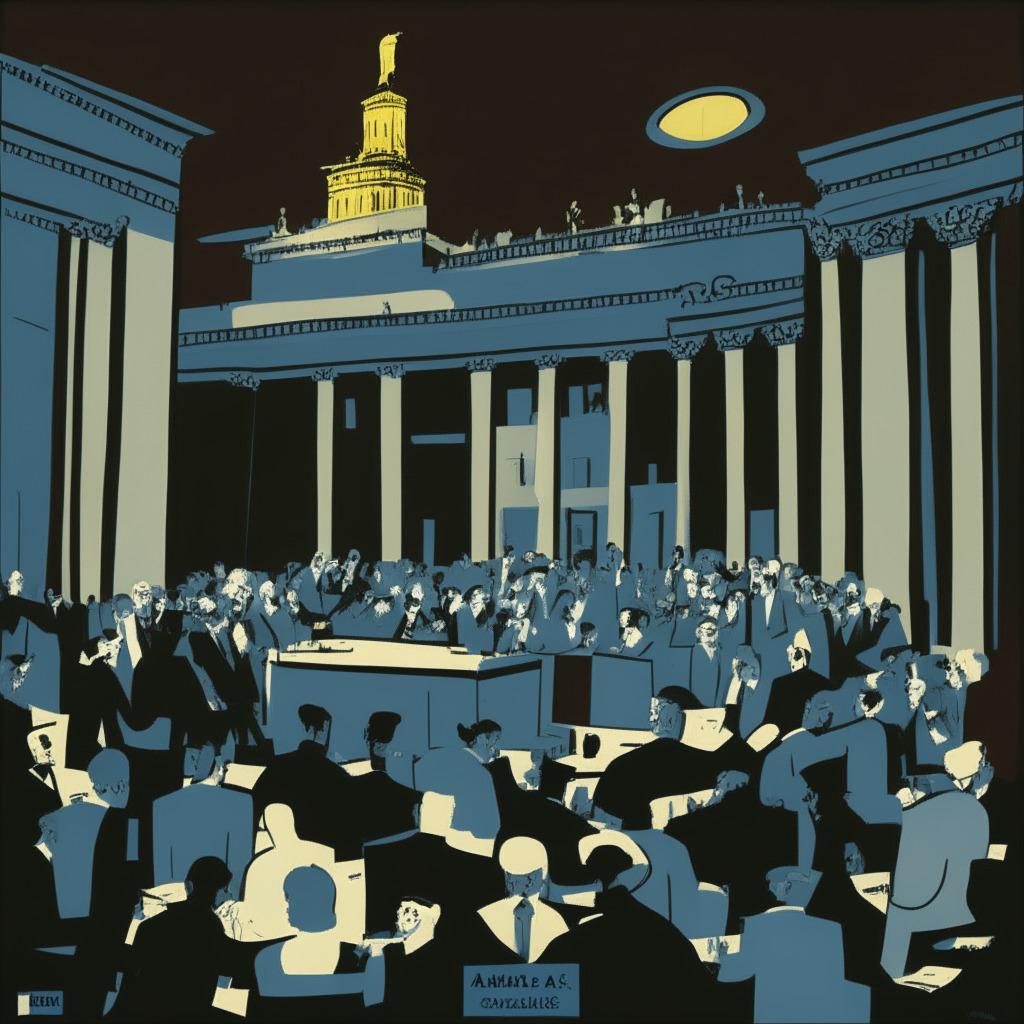“A staunch crypto advocate, Representative Patrick McHenry, has provisionally stepped into the role of US House Speaker. McHenry has shown appreciation for the significance of American innovation and advocated for stablecoin regulation. These transitions bring opportunities and challenges for digital currencies and their regulation.”
Search Results for: Biden
Navigating Bitcoin Investments Amid U.S. Government Shutdown Fears: Strategies and Risks
Bitcoin’s rise towards $28,000 was linked to U.S. debt limit uncertainty. Despite skirting an immediate shutdown, risks of recession persist due to factors like inflation and surging oil prices. Bitcoin investors are bracing themselves for potential volatility as the debt ceiling decision nears, with strategic trading moves critical in this climate of uncertainty.
Kazakhstan’s Crypto Crisis: A Plea to Survive Amidst Soaring Energy Costs
In an open letter to President Kassym-Jomart Tokayev, Kazakhstan-based digital asset miners, including eight major entities, urgently request a decrease in energy prices. They warn of industry-wide dessertion caused by untenable fees and increasing operational challenges, threatening an extinction of the country’s thriving mining ecosystem.
Government Shutdown Dodged: Possible Fallout for Cryptocurrency Regulation
“The future of cryptocurrency regulation was at risk with the potential for a government shutdown. This stalemate could have hindered several key crypto-focused bills, including the Financial Innovation and Technology for the 21st Century Act, the Blockchain Regulatory Certainty Act, among others, shaping crypto’s future.”
Divisive Lines: How SEC’s Gensler Grapples with Criticisms & Questions on Crypto Oversight
Gary Gensler, SEC Chair, recently faced criticism over cryptocurrency market monitoring. Critics accused him of stifling markets with excessive regulation, promoting a “woke” agenda, and lacked certainty in classifying Bitcoin. The future of cryptocurrency regulation remains a divisive topic among industry participants and lawmakers.
US Central Bank Digital Currency: Speed of Transaction vs Privacy Concerns
“The United States House Financial Services Committee is considering further restrictions on a central bank digital currency (CBDC). Critics argue that a CBDC would centralize control, contradicting the philosophy behind cryptocurrency, and posing potential privacy risks. Despite some progress, the future of a U.S. CBDC remains uncertain.”
Bitcoin and Bureaucracy: Can a US Government Shutdown Ignite a Cryptocurrency Bull Run?
Marcel Pechman investigates the impact a potential U.S. government shutdown could have on Bitcoin, suggesting that an imbalance in wealth, rising consumer fear over escalating prices, and the possibility of inflation exceeding income growth could impose downward pressure on the cryptocurrency. Despite this, the shutdown could also spark a Bitcoin rally.
The Tug of War: The U.S.’s Potential Leap into Digital Currency vs Fears of Surveillance
The U.S. House of Representatives is considering the introduction of a Central Bank Digital Currency (CBDC), amidst contrasting views. Democrat Rep. Stephen Lynch calls for a pilot project for a digital dollar, stressing it is “absolutely critical” for the U.S. to show leadership in digital currency development. However, concerns remain regarding transaction management, tracking, and potential regulatory limitation issues.
Crypto’s Journey through the Labyrinth of US Law: Struggles, Triumphs, and Future Projections
“In just a half decade, the digital assets industry has seen significant evolution. Despite challenges caused by regulatory scrutiny, anti-money-laundering concerns, and varying political views, the adoption trend for crypto continues to rise. The anticipated regulatory changes and upcoming elections, particularly in 2024, present an opportunity for a fresh perspective on digital assets’ development and use.”
Failing or Succeeding? Evaluating The Blockchain Association’s Influence on Crypto Legislation
The Blockchain Association, a leading crypto trade association, continues to face skepticism and regulatory hurdles despite its five-year existence. With progress impeded by the fall of FTX and reduced support from congress members, the association’s efforts to pass comprehensive crypto legislation remain unsuccessful. Notwithstanding these setbacks, it has managed some victories in mitigating impacts of proposed regulations and supporting member companies. However, the future still presents significant obstacles, and crypto lobbyists are urged to remain humble about their “achievements.”
Portrait of Legal Challenges and Tech Advancements in Crypto Space: The FTX Boss and SEC’s AI Integration
Former FTX boss, Sam Bankman-Fried, faced legal complications over his request for temporary release, highlighting challenges in the technological logistics of preparing for trial with limited internet access in prison. Conversely, SEC Chair, Gary Gensler, revealed the agency’s use of AI for financial scrutiny, stirring both excitement and skepticism around potential benefits and concerns such as data privacy and transparency.
AI Partnerships: Unveiling the U.S.-Vietnam Collaborations-Skeletons or Springboards?
U.S. and Vietnam solidify ties through business partnerships focused on AI technologies, cloud computing and semiconductors. Industry giants like Google, Intel, Microsoft, and Nvidia support this initiative, signaling Vietnam’s shift from economic centralization to a more open approach.
Shaping Elections 2024: How Cryptocurrency Could Swing the Political Pendulum
“Crypto guru, Brian Armstrong, predicts that the exploding interest in crypto will turn it into a defining issue in the 2024 elections. As 56 million Americans already operate with digital currency, its potential implications are engaging presidential candidates. However, the quest for clear crypto regulation still looms, with opportunities for legislative clarity potentially arising from the Securities and Exchange Commission.”
Texas Mining Clampdown and Bitcoin’s Turbulence: Is $20K the New Norm?
“The escalating energy crisis in Texas has led to a suspension of Bitcoin mining, pushing Bitcoin’s price down to $25,900. This event, along with weakening prices, increased rivalry, and reduced returns post-halving, creates challenges for the mining sector. Despite the current scenrio, crypto enthusiasts anticipate a promising 2023, mixed with risk and volatility.”
Balancing Cryptocurrency Taxation: Equity and Evasion in the Digital Asset Space
The Blockchain Association, a U.S-based crypto advocacy group, submitted legislation proposals for equal taxation of crypto and non-crypto assets. The recommendations support the Keep Innovation in America Act, which aims to revise reporting standards for cryptocurrency transactions. Concerns arise around potential tax evasion and proposed digital asset mining excise tax.
Navigating the US Crypto Regulatory Hurdles: Will Clarity Emerge or Companies Relocate?
The United States’ unclear crypto regulations are driving companies to seek more crypto-friendly countries. Tennessee Senator, Bill Hagerty, supports comprehensive cryptocurrency legislation in the US, replacing the current ‘regulation by enforcement’. He also highlights risks in the unrestricted adoption of Central Bank Digital Currencies (CBDCs).
FTX Saga: A Look into Big Finance, Politics, and Blockchain Intersection
“The indictment against FTX’s founder, Sam Bankman-Fried, for alleged violation of campaign finance laws and connections to a multibillion-dollar fraud gains momentum as key figures, including Ryan Salame, plead guilty. This saga highlights the intersection of finance, politics, and blockchain, shedding light on the potential misuse of this potent mix and prompting questions regarding customer safeguarding and innovation enhancement.”
Tencent’s AI Leap Amidst US-China Tensions: Breaking Down the Hunyuan System
“Tencent has introduced its ‘Hunyuan’ AI system, a multimodal large language model similar to OpenAI’s ChatGPT. The system supports functions like image creation, text recognition, and customer service, and can contribute to sectors such as finance, social media, and e-commerce.”
Cryptocurrency in the Political Arena: Impact on the US Presidential Race
The upcoming US presidential race sees prominent “crypto candidate” Ron DeSantis in competition with other pro-crypto candidates. Amid this, the potential influence of Donald Trump’s crypto assets for 2024 raises intriguing questions for the future of cryptocurrency in the US.
The US: Falling Behind In The Blockchain Race? Evaluating Current Policies and Ambitions
Chris Larsen, Ripple Labs’ Chair, criticized the current Biden administration’s approach to cryptocurrency policy, suggesting its ambiguity has caused confusion within the sector. Larsen also argued that current policies push the industry offshore, naming Dubai, Singapore, and London as emerging global blockchain capitals. Meanwhile, the race for the first US spot Ethereum ETF is heating up.
Evaluate Onchain Summer’s Impact and Jefferson’s Appointment on Crypto Market Future
‘Onchain Summer,’ an event promoting Base, Ethereum’s layer-2, saw 700,000 NFTs minted by over 268,000 users. Over $242 million in crypto assets were transferred to Base whilst facing challenges like network outages and scams. Philip Jefferson’s appointment as Federal Reserve vice chair signals potential advancements and uncertainties for the crypto sector.
Navigating the Blockchain Future: The Impact of Federal Leadership Changes on Crypto Regulation
“The leadership at institutions like the Federal Reserve significantly influence policy changes, specifically cryptocurrency and blockchain regulation. While the US Federal Reserve reportedly has no plans for a digital dollar, the recent changes in leadership may significantly impact future policy. As cryptocurrencies and blockchain technology reshape financial systems, the balance between innovation and regulation remains a focus.”
The New ‘Crypto-politics’: Pros and Cons of Accepting Cryptocurrency Donations in Political Campaigns
“Florida’s Governor, Ron DeSantis, plans to announce the acceptance of crypto donations for his 2024 campaign, an interesting turn from traditional funding. However, cryptocurrency donations introduce complexity regarding traceability and potential misuse. The political landscape’s inherent unpredictability combined with cryptocurrency’s volatility invite intriguing consequences.”
Navigating The Storm: New Regulatory Frameworks on AI and Crypto Chip Exports Stir Global Markets
“Regulatory frameworks globally are revising their stance on ASIC chip exports, pivotal in cryptographic technologies. The U.S. Department of Commerce denies prohibiting AI chips sale to the Middle East. However, new regulations require tech giants to get licenses for selling flagship chips to some Middle Eastern countries.”
The Bitcoin Market Quandary: An Era of Opportunities Amid Regulatory Tensions
“As Bitcoin’s price slips by over 4%, a significant opportunity emerges with a court ruling in favor of Grayscale. This decision could inspire a surge in cryptocurrency innovation across the United States. However, the unfolding narrative around regulatory frameworks is shaping market sentiment and raising concerns about future regulations, potentially hindering growth.”
Grayscale’s Victory Stirs Up Controversy: Doubts Over SEC’s Gensler Heighten
“Cryptocurrency circles discuss Grayscale’s lawsuit and SEC chair Gary Gensler’s role. Congressman Warren Davidson suggests Gensler’s SEC decisions lack stead, as demonstrated by Grayscale’s legal victory. This opens up possibilities for a Bitcoin spot ETF emergence in the US, but the situation remains uncertain.”
Unleashing Bitcoin Mining: The Untapped Catalyst for America’s Green Energy Transformation
“Bitcoin mining could potentially revolutionize America’s energy landscape by generating green, efficient, renewable, zero-emission energy sources. It makes unprofitable ventures profitable, enhances our energy grid’s efficiency, helps manage load, and contributes to a sustainable energy-conscious culture.”
Miami’s Blockchain Mayor Bows Out: What Suarez’s Presidential Campaign Suspension Means for Cryptocurrency Future
“Suarez, Miami’s Mayor, known for his bitcoin-friendly stance, accepted bitcoin as campaign donation and has explored the use of blockchain technology. Despite facing challenges, his pursuit of these technologies prompts discussion on the role of digital currencies in future political campaigns and public administration.”
Navigating the Regulatory Labyrinth: New Rules and Fluctuating Tides in Crypto Sphere
“The United States Internal Revenue Service (IRS) is proposing new tax policies for the sale/exchange of digital assets by brokers, attracting criticism from crypto figures. Meanwhile, Gemini, a cryptocurrency exchange, faces a SEC lawsuit on potential regulatory violations. These developments reflect the ongoing struggle to balance regulation with innovation in the emerging field of cryptocurrency.”
Crypto Regulation: Candidates’ Stances and Upcoming Election Implications
“Crypto regulation has become a significant issue in U.S. presidential campaigning. Candidates’ positions vary widely, from skepticism to enthusiastic adoption, yet the subject of digital assets regulation was absent from the recent Republican debate. This highlights the increasing importance of cryptocurrencies in our socio-political landscape, and suggests a need for informed legislation.”
Laos Electric Company Curbs Crypto Mining Amidst Energy and Environmental Concerns
“Electricite du Laos (EDL) announces a significant cut to crypto mining firms’ operations, due to rising concerns on electricity production & environmental impact. This comes after Laos’ attempt to become a digital assets mining hub following China’s stringent regulation.”
Bitcoin’s Destiny Amidst Cryptocurrency Tax Reporting: Market Reactions and Concerns
Bitcoin continues to dominate digital currencies despite a minute dip influenced by President Biden’s crypto tax propositions. However, concerns are growing that these proposals may stifle industry growth and innovation. Meanwhile, a new model for Bitcoin valuation based on on-chain metrics offers deeper cryptosphere insights, and Bitcoin’s trading faces significant resistance levels.































